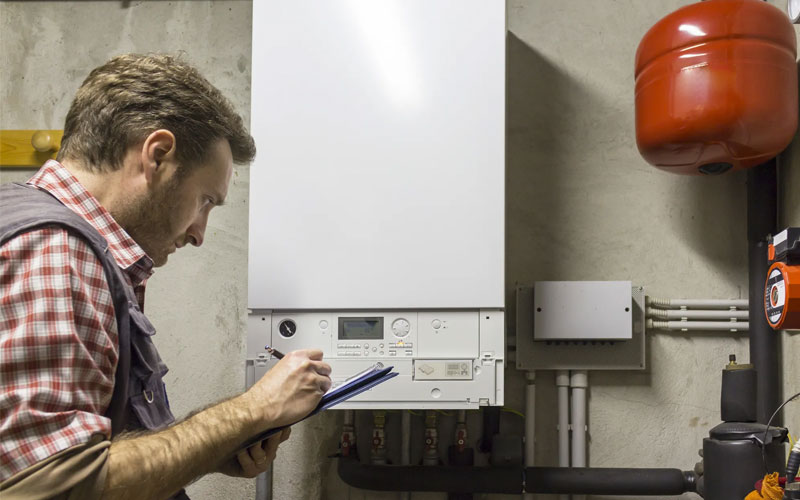
Understanding Heating Efficiency
Maintaining warmth during the cold months doesn’t necessarily translate to high energy bills or inefficiency. By optimizing your heating system, you can achieve a comfortable living environment without financial strain. Heating efficiency ensures your home retains warmth effectively, minimizing energy wastage. This creates a cozy atmosphere and has the added benefit of reducing expenditures and your carbon footprint.
The secret to successful energy use lies in balancing comfort and efficiency. Homeowners can take practical measures to decrease energy use, leveraging affordable adjustments and practices to keep warm, conserve resources, and enhance the quality of life during colder times.
Types of Heating Systems
Determining the appropriate heating system for your dwelling is crucial to achieving the desired efficiency and cost-effectiveness. The most common systems include furnaces, heat pumps, and boilers — each offering distinct advantages and some drawbacks.
Furnaces
Furnaces are popular for their ability to provide immediate warmth. They come in various types, using fuels like natural gas, oil, or electricity. Typically, gas furnaces are more prevalent due to their cost-efficiency and ease of use.
Heat Pumps
Unlike traditional furnaces, heat pumps transfer heat rather than generating it, making them highly efficient. Functioning as heating and cooling systems, they can be economical in regions with moderate climates.
Boilers
Boilers provide a distinct advantage with their silent operation and capability for ensuring even heat distribution. Though the initial installation might be costly, the overall efficiency in conserving energy often justifies the investment over time.
Effective Home Insulation
Insulation is pivotal in an efficient heating strategy. It acts as a barrier that traps warmth inside your home. An adequately insulated home requires less energy to heat, resulting in lower energy bills. Fiberglass, foam board, and cellulose are common insulation materials, varying in performance, cost, and suitability for different areas of your home.
To maximize efficiency, focus on insulating spaces where heat commonly escapes — attics, walls, windows, and doors are prime areas. Effective insulation can substantially reduce heating requirements, keeping your home warm throughout the winter.
Smart Thermostat Usage
Smart thermostats represent a significant innovation for enhancing heating efficiency. These devices allow homeowners to control their heating systems remotely and fine-tune settings for optimal performance. In addition to heating, many smart thermostats seamlessly integrate with air conditioning systems, ensuring year-round comfort and energy efficiency. A smart thermostat can adapt to your daily routines, learning when to lower or raise temperatures, thereby minimizing unnecessary heating or cooling. By using a smart thermostat, you can increase heating efficiency and see a noticeable reduction in energy costs. These thermostats have user-friendly interfaces that provide easy programming and connectivity options.
Regular Maintenance and Servicing
Regular maintenance is vital to ensure your heating systems remain in top condition. Simple maintenance tasks such as replacing filters, cleaning out ducts, and verifying thermostat accuracy can significantly boost efficiency and prolong the life of your system.
Scheduling annual professional inspections is highly recommended. These checks help pinpoint potential issues before they become costly problems, ensuring your system runs smoothly throughout the colder months without unexpected interruptions.
Eco-friendly Heating Options
As environmental concerns become more prominent, the appeal of sustainable heating alternatives grows. Solutions like solar panels and geothermal systems stand out for their ability to reduce reliance on conventional energy sources, promoting sustainability while providing opportunities for significant long-term cost savings.
While these options may involve higher initial investments, the resulting environmental benefits and potential energy savings render them attractive. Opting for these green solutions is a factor of current efficiency needs and anticipates future energy demands.
Reducing Heating Costs
Cutting heating costs means maintaining indoor comfort. Numerous strategies can be used to save on heating expenses, such as sealing drafts, taking advantage of natural sunlight, and setting thermostats lower when the house is not occupied.
Moreover, simple energy-saving habits like layering in warmer clothing indoors and covering floors with rugs can maintain warmth and comfort without increasing heating costs. These small changes collectively contribute to substantial cost reductions.
Future Trends in Home Heating
Looking ahead, exciting advancements in heating technology promise enhanced efficiency and sustainability. Smart home integration and renewable energy developments are poised to transform how heating solutions are executed. Homeowners can anticipate these breakthroughs, offering improved efficiency and seamless integration with eco-friendly practices.





